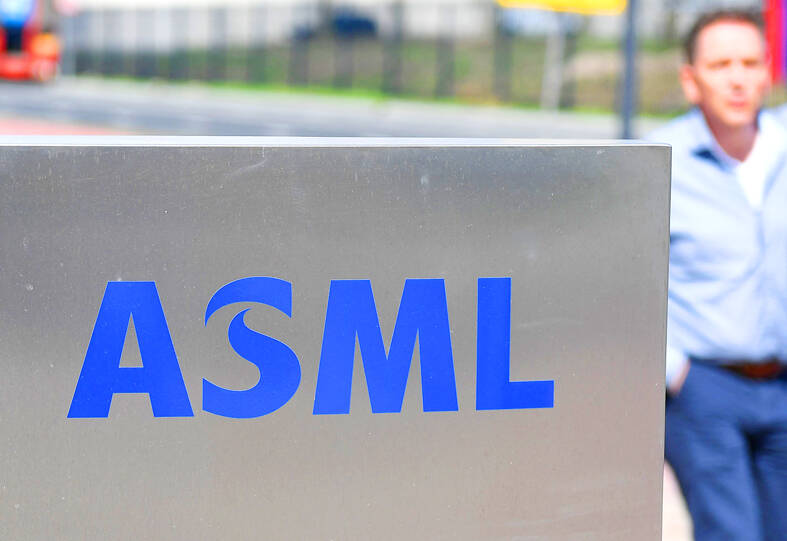ASML Holding NV reported orders for the first quarter that were almost a billion euros less than expected and warned that it does not know how to quantify the impact from recent tariff announcements, which are threatening to upend the semiconductor industry.
The Dutch company, which counts Taiwan Semiconductor Manufacturing Co (台積電) and Intel Corp among its biggest customers, reported bookings of 3.94 billion euros (US$4.48 billion), compared with an average estimate of 4.82 billion euros by analysts surveyed by Bloomberg.
Its shares yesterday sank more than 7 percent in Amsterdam.

Photo: AFP
ASML is the sole producer of cutting-edge lithography machines used by semiconductor companies to make advanced chips for products including Apple Inc’s smartphones and Nvidia Corp’s artificial intelligence (AI) accelerators. Concern over a potential slowdown in AI demand has intensified after disappointing outlooks from some chipmakers and analyst warnings, compounded by looming US tariffs.
“The recent tariff announcements have increased uncertainty in the macro environment and the situation will remain dynamic for a while,” ASML chief executive officer Christophe Fouquet said in a statement yesterday.
ASML outlined ways US tariffs could affect its business, including additional charges on shipments of new systems, tools and parts imported into the country.
Another possible risk is other countries “imposing tariffs on things that are being shipped from the United States into these countries,” ASML chief financial officer Roger Dassen said in a video accompanying the results.
The firm’s “conversations so far” with customers support its expectation that this year and next year would be growth years, driven by AI investments, Fouquet said.
The company’s extreme ultraviolet lithography machines accounted for 1.2 billion euros of net bookings in the quarter.
China accounted for 27 percent of ASML’s net system sales, making it the company’s second-biggest market during the quarter. While that is the same contribution from the preceding three months, it is a drop from the average of 41 percent last year.
ASML forecast that if AI demand continues to be strong and its customers are capable of adding capacity, it had the opportunity to meet the upper range of its total net sales guidance of 30 billion to 35 billion euros for this year.
However, uncertainty with some of its customers could take it to the lower end of the range, it said.
The first quarter orders “disappointed” and the tariff uncertainty is clearly “clouding” the outlook, Citigroup Inc analyst Andrew Gardiner wrote in a note, but pointed to ASML’s reiterated full-year forecast and expectations of further growth next year.
Barclays PLC analyst Simon Coles said that ASML would need 3 billion to 5 billion euros of orders each quarter for the next three to five quarters to hit consensus expectations.
“This seems manageable, but our worry is two major customers are unlikely to be ordering significantly any time soon,” he said.

Taiwanese suppliers to Taiwan Semiconductor Manufacturing Co. (TSMC, 台積電) are expected to follow the contract chipmaker’s step to invest in the US, but their relocation may be seven to eight years away, Minister of Economic Affairs J.W. Kuo (郭智輝) said yesterday. When asked by opposition Chinese Nationalist Party (KMT) Legislator Niu Hsu-ting (牛煦庭) in the legislature about growing concerns that TSMC’s huge investments in the US will prompt its suppliers to follow suit, Kuo said based on the chipmaker’s current limited production volume, it is unlikely to lead its supply chain to go there for now. “Unless TSMC completes its planned six

Power supply and electronic components maker Delta Electronics Inc (台達電) yesterday said second-quarter revenue is expected to surpass the first quarter, which rose 30 percent year-on-year to NT$118.92 billion (US$3.71 billion). Revenue this quarter is likely to grow, as US clients have front-loaded orders ahead of US President Donald Trump’s planned tariffs on Taiwanese goods, Delta chairman Ping Cheng (鄭平) said at an earnings conference in Taipei, referring to the 90-day pause in tariff implementation Trump announced on April 9. While situations in the third and fourth quarters remain unclear, “We will not halt our long-term deployments and do not plan to

‘SHORT TERM’: The local currency would likely remain strong in the near term, driven by anticipated US trade pressure, capital inflows and expectations of a US Fed rate cut The US dollar is expected to fall below NT$30 in the near term, as traders anticipate increased pressure from Washington for Taiwan to allow the New Taiwan dollar to appreciate, Cathay United Bank (國泰世華銀行) chief economist Lin Chi-chao (林啟超) said. Following a sharp drop in the greenback against the NT dollar on Friday, Lin told the Central News Agency that the local currency is likely to remain strong in the short term, driven in part by market psychology surrounding anticipated US policy pressure. On Friday, the US dollar fell NT$0.953, or 3.07 percent, closing at NT$31.064 — its lowest level since Jan.

The New Taiwan dollar and Taiwanese stocks surged on signs that trade tensions between the world’s top two economies might start easing and as US tech earnings boosted the outlook of the nation’s semiconductor exports. The NT dollar strengthened as much as 3.8 percent versus the US dollar to 30.815, the biggest intraday gain since January 2011, closing at NT$31.064. The benchmark TAIEX jumped 2.73 percent to outperform the region’s equity gauges. Outlook for global trade improved after China said it is assessing possible trade talks with the US, providing a boost for the nation’s currency and shares. As the NT dollar